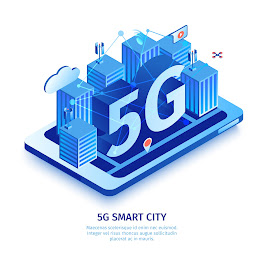The Role of 5G in IoT and Smart Cities
Introduction
With the rollout of 5G, we’re entering a new era of connectivity, especially for the Internet of Things (IoT) and the development of smart cities. As urban areas expand and evolve, the need for efficient, sustainable, and tech-driven solutions is at an all-time high. 5G technology plays a critical role in making this vision a reality by enabling faster communication, lower latency, and the ability to connect a vast number of devices. In this article, we’ll break down how 5G is transforming both IoT and smart cities in simple terms.
What is 5G Technology?
5G is the latest generation of mobile networks. While its predecessor 4G improved mobile internet speeds, 5G takes things to a whole new level. The key benefits of 5G include:
- Faster internet speeds (up to 100 times faster than 4G).
- Very low latency, which means less delay when sending and receiving data.
- Ability to connect more devices at once without slowing down.
These benefits make 5G perfect for powering IoT devices and running the complex systems needed in smart cities.
How 5G enhances IoT
1. Connecting many devices at once.
The Internet of Things (IoT) refers to ordinary objects that can connect to the internet, including smart household appliances, sensors, and even vehicles. With 5G, we can link millions of devices simultaneously. Whether it's smart thermostats in houses or sensors that monitor air quality, 5G allows these gadgets to function without overloading the network.
2. Real-time responses.
One of the most significant advantages of 5G is its low latency, which allows data to be delivered nearly quickly. This is critical for systems that require real-time responses, such as self-driving automobiles and medical equipment. To avoid accidents, a self-driving car must process information from its surroundings immediately. 5G ensures the car gets the data it needs fast enough to react safely.
3. Saving Power for IoT Devices
Many Internet of Things devices, such as environmental sensors and wearable technology, are compact and battery-powered. 5G allows these gadgets to use electricity more efficiently, prolonging battery life. This means that IoT devices may stay active for longer durations without needing frequent recharging or maintenance, which is critical for large-scale projects like smart cities.
5G's Impact on Smart Cities
1. Improved Infrastructure Management.
Smart cities use technology to better manage their urban infrastructure. Cities using 5G can place smart sensors on bridges, roads, and buildings to monitor their condition in real time. If a bridge begins to exhibit indications of wear, the sensors may instantly notify maintenance personnel, averting accidents and boosting public safety.
2. Smarter Traffic Systems.
Traffic bottlenecks are everyone's nightmare. 5G can help minimize traffic congestion by utilizing intelligent transportation systems. Real-time data allows traffic signals to change themselves based on the amount of automobiles on the road. 5G also enables autonomous vehicles to connect with one another and the city's infrastructure, making roadways safer and more efficient.
3. Energy-Efficient Public Services.
5G technology can also help cities become more energy efficient. For example, smart streetlights powered by IoT can alter their brightness in real time, consuming less energy when there is no traffic or people. Similarly, smart waste management systems can alert garbage collectors when bins are full, improving waste pickup schedules and lowering fuel consumption.
4. Improved Security and Public Safety.
Cities using 5G can deploy more effective surveillance systems to monitor public locations in real time. Smart cameras connected to 5G can detect suspicious conduct and notify police immediately. During emergencies, 5G-enabled drones can be utilized to speed up rescue efforts by delivering live video feeds to first responders.
How 5G and IoT Integrate to Create Smart Cities
1. Real-Time Data Collection
Smart cities depend on continual data from IoT devices to function properly. 5G enables the real-time processing and analysis of data acquired from sensors and other devices. This data helps municipal planners and managers make better decisions, whether they are rerouting traffic, managing electricity, or responding to disasters.
2. Create a Greener City
One of the most important goals for smart cities is to become more sustainable. Cities may use 5G and IoT to more efficiently manage resources such as water and energy. For example, smart grids can more equally distribute electricity, resulting in less waste and a lower carbon footprint. Real-time data from IoT devices also allows cities to monitor pollution levels and take measures to enhance air quality.
3. Collaboration between the public and private sectors.
Building a smart city necessitates collaboration among governments, commercial companies, and technology developers. 5G networks enable creative solutions that benefit everyone. For example, telecom companies and city officials can collaborate to establish smart transportation systems, whilst startups and tech firms can invent innovative IoT solutions for urban challenges.
Challenges for 5G in IoT and Smart Cities.
While the future appears promising, there are certain hurdles to fully adopting 5G in IoT and smart cities:
- Infrastructure costs: Establishing 5G networks necessitates significant investment in new infrastructure, which can be prohibitively expensive for cities to deploy.
- Security concerns: As the number of connected devices grows, so does the possibility of cyberattack. Securing 5G and IoT networks is critical to protecting sensitive data.
- Regulations: Governments must create clear rules for the safe and ethical use of 5G and IoT technology.
Despite these limitations, 5G's promise to alter urban living is apparent. As more cities adopt 5G, we should expect to see smarter, more connected urban settings.
Conclusion
Finally, 5G technology has the potential to transform the operation of IoT devices and smart cities. With higher speeds, lower latency, and the capacity to connect more devices, 5G will allow for real-time solutions to urban concerns. From improving traffic flow and energy management to boosting public safety, 5G has a significant impact on the future of cities.








.jpeg)
1 Comments
Useful content 👍 very helpful for me
ReplyDeleteAny Doubts Feel Free And Drop A Comment!